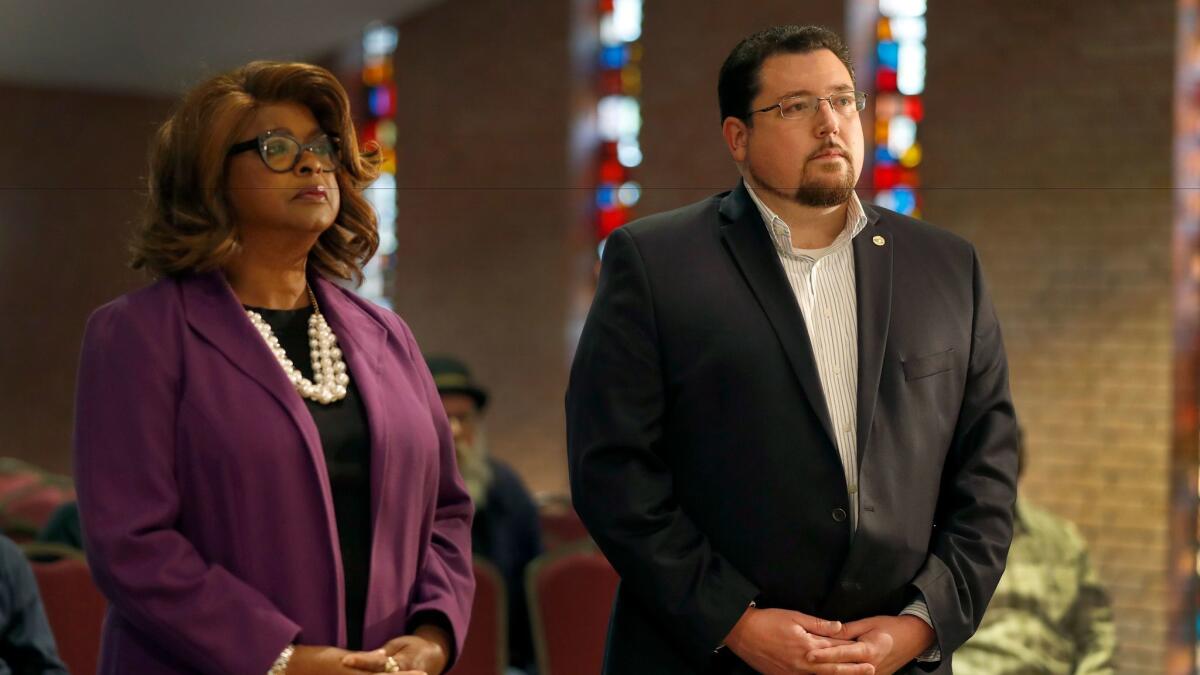Ferguson’s white mayor wins reelection in his first race since 2014 unrest

- Share via
The mayor of Ferguson, Mo., was reelected to a third term Tuesday night, pulling off a remarkable feat of political survival in the St. Louis suburb’s first mayoral election since protests erupted there three years ago.
James Knowles III was mayor on Aug. 9, 2014, when a white police officer shot and killed an unarmed black 18-year-old after a struggle. The shooting ignited a national protest movement that turned Ferguson into a symbol of racial dysfunction, with Knowles as one of its most prominent faces — a white official leading the overwhelmingly white government of a city that was two-thirds black.
By a margin of 56% to 44%, Knowles defeated his lone challenger, Councilwoman Ella Jones, who is black. If Jones had won, she would have made history as the first black mayor of a city that was once an overwhelmingly white “sundown town” where, until the 1960s, African Americans were banned after dark.
Instead, Knowles remains in office after the protests that led to a wave of resignations and departures among the city’s political leadership, which now faces new uncertainty under the Trump administration.
The election fell a day after Atty. Gen. Jeff Sessions ordered the Justice Department to review its consent decrees with embattled police departments like Ferguson’s. The legal pacts aim to limit racial profiling and excessive use of force, and Ferguson officials and activists are uncertain about what level of federal oversight to expect.
The shooting death of Michael Brown revealed the stark racial gap separating the city government and its residents. Ferguson was undergoing a demographic shift and had become two-thirds black, but five of the six council members were white, as were the police chief, city manager and almost all of the city’s police officers.
An investigation by the Obama administration’s Justice Department, launched after daily protests engrossed the nation, found city employees emailing racist jokes to each other, as well as a pattern of racial discrimination by police. The report said black drivers were twice as likely to get pulled over but 26% less likely to be found with contraband than white drivers.
After a wave of resignations and elections, Ferguson now has three black council members, a black police chief and a black city manager.
But Knowles remains, to the ire of local activists who have long protested him. (Knowles couldn’t be reached by phone Tuesday and did not answer an email.) He survived a recall attempt in 2015 and, unbowed, launched a bid for a third and final three-year term as mayor.
In a Facebook post in February, Knowles said he wanted to follow the example of President Abraham Lincoln:
“For those familiar with history, during the Civil War, Lincoln was often criticized by people on both sides of the issues of slavery and the war because of his even-handedness and his resistance to the pressures of radicals on both sides. He knew radicalism, even after the war, would further divide us, which it has for generations.”
Knowles’ bid drew a challenge from Jones, a newcomer to the City Council who had a busy election day Tuesday trying to persuade last-minute voters that it was time for a change.
“Phone banking, delivering lunch to the poll workers, knocking on doors — I’m doing everything,” Jones said in an interview. “It’s time for Ferguson to unite and become one Ferguson, and we cannot move forward under the leadership that we are under at this point.”
Jones criticized Sessions’ move to review Ferguson’s consent decree with the federal government, which Sessions had previously said was based on a report that was “anecdotal” and “not so scientifically based.”
Sessions’ action “is not going to help Ferguson at all,” Jones said. “We need that consent decree in order to keep Ferguson moving forward.”
Money has become a problem following the protests, leading officials to push for recent hikes of the sales tax (which was successful) and the property tax (which was not).
City Manager De’Carlon Seewood recently wrote that after a “drastic decline” in revenue, “the city’s operating budget is beyond lean. It’s emaciated.”
It’s not hard to see why. Before the protests, the city of roughly 21,000 drew much of its general revenue from fining motorists and residents — who were often poor and black — over minor infractions and then jailing them if they couldn’t pay. Court fines were a bigger source of revenue than property taxes, making up almost $2 million of the city’s $12.5 million in revenue in 2014.
But following protests and reforms at the local and state level, revenue from court fines has plummeted by almost 75%. One city budget analysis said police issued 2,197 tickets in 2016 compared with 14,590 tickets in 2014.
With 71% in favor, voters also overwhelming supported a ballot measure Tuesday to require that the city’s police officers keep their body cameras on at all times, with certain exceptions, and that the footage be stored for two years.
matt.pearce@latimes.com | @mattdpearce
ALSO
White House and GOP aim for do-over of failed Obamacare repeal, but chances for agreement are slim
At Trump’s EPA, going to work can be an act of defiance
Washington may be shaking its head, but Devin Nunes is still a hometown hero
UPDATES:
8:50 p.m.: Updated with election results.
This article was originally published at 6:45 p.m.
More to Read
Sign up for Essential California
The most important California stories and recommendations in your inbox every morning.
You may occasionally receive promotional content from the Los Angeles Times.














